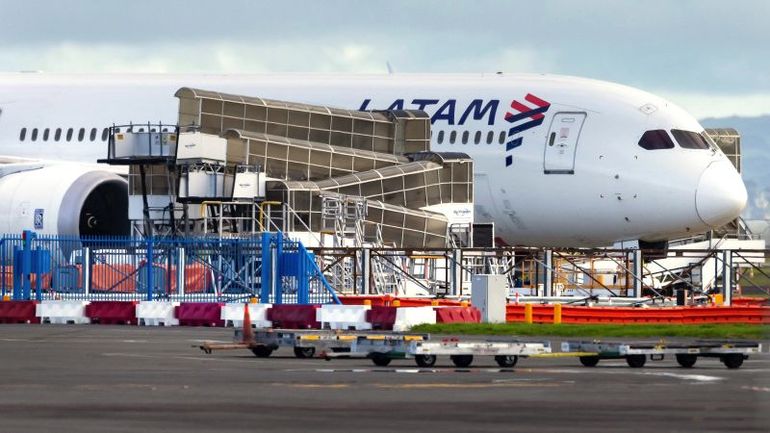
Challenges Mount for Boeing

Just when it seemed like Boeing's turbulent 2024 couldn't get any more challenging, a recent incident involving a 787 mid-flight scare has added to their woes. With passengers injured and a pilot struggling to regain control, the aircraft's safe landing highlights the ongoing troubles faced by the aviation giant.
Boeing's challenging 2024 took another hit on Monday when a 787 Dreamliner experienced a sudden drop mid-flight, causing injuries to numerous passengers. The pilot managed to regain control and safely land the aircraft, but the reason for the dramatic descent during the LATAM flight from Australia to New Zealand remains unknown. Both LATAM and Boeing are investigating the incident to determine the cause of the "technical event." This unexpected development is certainly not what Boeing's management or the flying public wanted to hear at this time.
The company's string of bad news started at the beginning of the year when part of an Alaska Airlines 737 Max came off the plane shortly after takeoff. A federal investigation suggested that Boeing may have forgotten to install the bolts in the door plug meant to prevent such incidents.
As a result of this incident, certain 737 Max jets were temporarily grounded nationwide. This was followed by congressional hearings, delays in production and delivery, multiple federal investigations - including a criminal probe, and a significant decrease in the company's stock value by a quarter, causing a $40 billion loss in market valuation.
Boeing faces the risk of losing billions more dollars due to lawsuits, potential fines, and lost business from the blowout.
In more bad news, pilots on a United Airlines 737 Max reported flight control issues during landing in Newark in February. The National Transportation Safety Board is currently investigating the incident. Additionally, the Federal Aviation Administration recently raised concerns about safety issues with the de-icing equipment on 737 Max and 787 Dreamliner models, which could potentially lead to engine thrust loss. Despite this, the FAA has allowed the planes to continue flying, with Boeing stating that the problem does not pose an immediate safety risk.
Last week, Boeing received additional negative news. The NTSB revealed that Boeing had not furnished records documenting the procedures followed on the assembly line for the door plug replacement on the Alaska Airlines jet. Boeing claimed that these records do not exist.
Furthermore, the FAA indicated that Boeing's safety and quality issues go beyond just paperwork deficiencies. After examining Boeing's production processes and standards, FAA Administrator Mike Whitaker stated on Monday that the regulator had identified problems with crucial aspects of Boeing's manufacturing and assembly line.
Whitaker emphasized that the issues were not limited to paperwork. He mentioned that the sequence of work and tool management were also significant factors. While it may seem trivial, having an efficient system to track tools is crucial in a factory to ensure the right tool is used and not misplaced.
Boeing has acknowledged the problems highlighted by Whitaker and is currently addressing them. The FAA has directed the company to provide a plan to resolve its production issues by the end of May.
CNN
video
Related video
Boeing stated that they are making immediate changes and creating a detailed plan to improve safety and quality based on FAA audit, quality stand downs, and expert panel report. They aim to regain the trust of their customers and passengers by being transparent and taking significant actions.
Boeing’s stock took a hit, dropping 3% on Monday due to the alarming LATAM flight news. In premarket trading on Tuesday, it fell another 1.5%. It currently stands as the second-worst performer in the S&P 500, just behind Tesla.
However, Boeing’s struggles in 2024 go beyond its stock performance. The company entered the year with a tarnished reputation, making it harder to regain the trust of airlines, regulators, and passengers with each new negative incident and headline.
CNN’s Colin McCullough and Greg Wallace contributed to this report.
Editor's P/S:
The recent string of incidents involving Boeing aircraft has raised serious concerns about the company's safety and quality control measures. The mid-flight incident involving a 787 Dreamliner and the ongoing investigations into the 737 Max have put Boeing under intense scrutiny. The company faces potential lawsuits, fines, and lost business as a result of these incidents.
Boeing's reputation has been severely damaged by these events, making it difficult for the company to regain the trust of airlines, regulators, and passengers. The FAA has identified problems with Boeing's production processes and standards, and the company has acknowledged these issues and is working to address them. However, the recent incidents have highlighted the need for Boeing to prioritize safety and quality above all else. The company must take immediate and comprehensive action to restore confidence in its products and services. It is imperative that Boeing takes swift and decisive action to address these issues, prioritize safety, and restore confidence in its products and operations.













